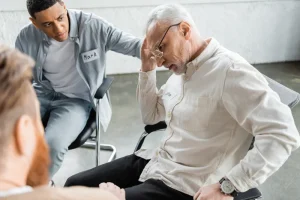
“Most of the injuries that arrived at the hospital were third-degree burns and amputations,” he said. Later on Monday, the nearby Nasser hospital in Khan Younis said 13 people killed in the strike had been brought there. At least 19 people have been killed in an overnight Israeli strike in the designated humanitarian zone in southern Gaza, the Hamas-run health ministry says. The final rules apply to health insurance issuers offering individual health insurance coverage for policy years beginning on or after January 1, 2026.
- Once your loved one has left rehab or stopped doing drugs for a significant period of time, they’re considered a person in recovery.
- There are many online resources that can help families learn about addiction.
- They can share some of the knowledge they’ve learned from private research, support groups and therapy sessions and give their friends destigmatizing words to use instead.
- These withdrawal-like symptoms are usually rooted in grief, DeMaria says, since the end of a relationship can feel like a devastating loss.
Communication Breakdown

Several communication strategies can help you show support and compassion in a healthy, effective way. The FHE Health team is committed to providing accurate information that adheres to the highest standards of writing. If one of our articles is marked with a ‘reviewed for accuracy and expertise’ badge, it indicates that one or more members of our team of doctors and clinicians have reviewed the article further to ensure accuracy.
Steps to Improve Mental Health
Addressing relationship issues in recovery can help to avoid potential conflict, which may lead to relapse in drinking or drug use. Involving partners in the treatment process and addressing the underlying issues that contributed to the addiction can help build a stronger foundation for a healthier, more loving relationship. This emotional distance creates a void in the relationship, making it difficult for the partner to feel loved and supported.
How To Detach from An Addict or Alcoholic and Still Love Them Without Enabling
- Although the causes may vary, a commonality of love addiction may be a false notion that your romantic partner will save you.
- Spending time making the meal together or cleaning up afterward can increase the benefits.
- Using “addiction” to describe this pattern is problematic for several reasons, explains Emily Simonian, a licensed marriage and family therapist with Thriveworks.
Living with someone who has an addiction can be hard for everyone involved. Aside from helping your loved one treat their addiction, it’s important to keep you and your family safe. Also, don’t be afraid to directly ask your loved one how they’re doing in the recovery phase. Asking them about any possible urges can help them talk out their feelings rather than giving into their impulses.
- Addiction is chronic and progressive, and without professional help or some form of intervention, it becomes worse and never better.
- Working together to navigate the recovery process and rebuild love in their relationship is crucial for long-term success.
- Understanding why you choose to behave in unhealthy ways is the key to making a change.
Tips for living with a loved one who has an addiction
If there are any concerns about content we have published, please reach out to us at “You don’t want to get into making a deal with the person,” Jacob said. Initial attraction stirs up neurotransmitters and hormones that create the excitement of infatuation and a strong desire to be close and sexual with the person.
- Providing housing, vehicles, attorneys, financial resources, etc. – This does not hold the substance user accountable and provides the enabler with the belief they are needed as well as keeping the addict happy with them.
- Although more common in romantic relationships, love addiction can occur within families, in friendships, and even with strangers.
- Saying “no” is an important first step toward change — for you, as well as for the addict.
- “Mind over matter” can’t work for us because our mind has literally been usurped—that is, eventually, addiction changes how our brain feels pleasure.
Although some individuals achieve long-term recovery on their first attempt, for others, it may take multiple attempts over multiple years. Keep your hopes up, as substance use disorder is known as a “good prognosis disorder” in that the majority of people can and do recover. The immediacy and consistency of positive rewards for any movement in a healthy direction has been shown to shape behavior in addictive individuals that can increase the odds of recovery.
Tips for living with a person in recovery from addiction

Love and an unhealthy attachment may coexist or be hard to differentiate. Because with addiction, we tend to idealize and often happily self-sacrifice for our partner. When differences and serious problems are largely ignored, minimized, or rationalized, we’re not really seeing or loving the whole person. Denial is a symptom of addiction loving an addict and supports a compulsion to cling to the relationship. Facing the truth would create inner conflict about our fear of emptiness and loneliness, which underlie addiction. Similarly, when our emphasis is on how our partner makes us feel or how he or she feels about us, our “love” is based on a self-centered, codependent need.
At this deeper organic level, dopamine is regularly cited as the chief culprit behind addictive tendencies. Beyond any particular addiction, dopamine is the chemical that drives most behavior. It’s not simply that it advances what’s vital to our survival—like eating, sleeping, and sexual expression—but that, less auspiciously, its inherent pleasure-inducing elements promote addiction and dependency. Specifically with a partner, it’s good to be honest with some of the complicated feelings you’ve been having. This can help you feel more open about what you’re feeling and can clue them into what you might be working through and why. When you hear the term ”love addiction,” you may think of a storybook character who gulps down a pink, sparkly love potion and suddenly finds themselves instantly infatuated with someone.

